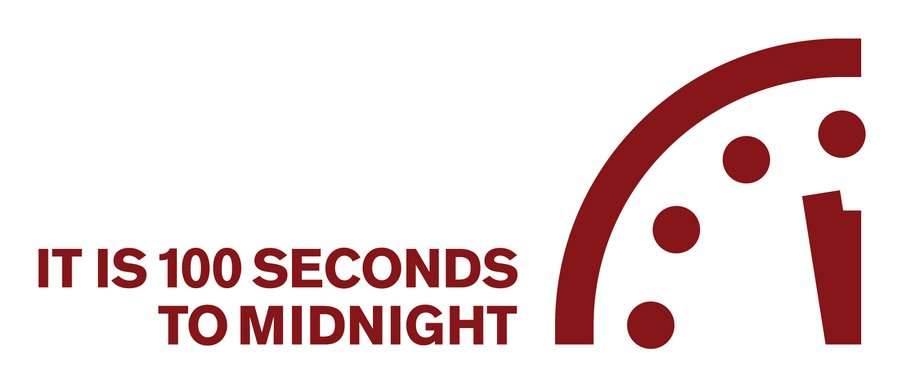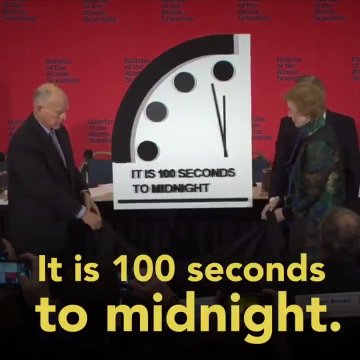Extract from ABC News
The symbolic clock is designed to represent how far the world is from annihilation and has been moved to 100 seconds to midnight, the closest it has ever been in its 73-year history — closer than at any point during the Cold War.
The Bulletin of the Atomic Scientists, which was founded after the creation of the atomic bomb in World War II and focuses on the greatest threats to human survival, warns that civilisation-ending nuclear war is a genuine possibility.
The keepers of the Doomsday Clock added that climate change which could devastate the planet is undeniably happening, citing bushfires from the Arctic to Australia.
The panel also declared governments and institutions have failed to sufficiently act against the threat of climate change — and in some cases even increased the risk of a catastrophe.
In a statement accompanying the clock's advance, the organisation said the nuclear and climate dangers "are compounded by a threat multiplier, cyber-enabled information warfare that undercuts society's ability to respond."
"The international security situation is dire, not just because these threats exist, but because world leaders have allowed the international political infrastructure for managing them to erode," it said.

1:07 AM - Jan 24, 2020
Rachel Bronson, president and CEO of the Bulletin of the Atomic Scientists, said: "We are now expressing how close the world is to catastrophe in seconds — not hours, or even minutes."
"We now face a true emergency — an absolutely unacceptable state of world affairs that has eliminated any margin for error or further delay," she said.
Former California governor Jerry Brown, the Bulletin's executive chairman, warned that "dangerous rivalry and hostility among the superpowers increases the likelihood of nuclear blunder."
"Climate change just compounds the crisis," he said.
"If there's ever a time to wake up, it's now."
The Doomsday Clock didn't move in 2019 but in 2018 it advanced by 30 seconds from two-and-a-half-minutes before midnight to two minutes to midnight.
As the symbolic clock was moved on Thursday, the Bulletin's experts were joined by former Irish president Mary Robinson who now leads The Elders, a group of prominent former world leaders founded by Nelson Mandela, and ex-UN Secretary-General Ban Ki-moon — now deputy chairman of The Elders.
Mr Ban said "our mechanisms for collaboration are being undermined when we need them most", citing the US withdrawal from the 2015 Paris climate agreement and the Iran nuclear deal to deadlock at nuclear disarmament talks, as well as divisions in the UN Security Council.
Ms Robinson called on world leaders to join in working "to pull humanity back from the brink".
The decision to move the clock forward was made by the group's science and security board, in consultations with its board of sponsors, which includes 13 Nobel laureates.
AP/ABC
Posted
A group of scientists is warning the planet is closer
to apocalypse than ever before, citing "existential danger" from
nuclear war and climate change as it moved the hands of the Doomsday
Clock 20 seconds closer to midnight.
Key points:
- The Bulletin of the Atomic Scientists moved the clock to 100 seconds to midnight warning civilization-ending nuclear war is a genuine possibility
- The keepers of the clock added that climate change which could devastate the planet is undeniably happening
- They cited bushfires from the Arctic to Australia as examples of the impact of climate change
The symbolic clock is designed to represent how far the world is from annihilation and has been moved to 100 seconds to midnight, the closest it has ever been in its 73-year history — closer than at any point during the Cold War.
The Bulletin of the Atomic Scientists, which was founded after the creation of the atomic bomb in World War II and focuses on the greatest threats to human survival, warns that civilisation-ending nuclear war is a genuine possibility.
The keepers of the Doomsday Clock added that climate change which could devastate the planet is undeniably happening, citing bushfires from the Arctic to Australia.
The panel also declared governments and institutions have failed to sufficiently act against the threat of climate change — and in some cases even increased the risk of a catastrophe.
In a statement accompanying the clock's advance, the organisation said the nuclear and climate dangers "are compounded by a threat multiplier, cyber-enabled information warfare that undercuts society's ability to respond."
"The international security situation is dire, not just because these threats exist, but because world leaders have allowed the international political infrastructure for managing them to erode," it said.
 “If decision makers continue to fail to act...citizens around the world should rightfully echo the words of climate activist @GretaThunberg and ask: ‘How dare you?’” — @RachelBronson1, President & CEO, Bulletin of the Atomic Scientists#DoomsdayClock
“If decision makers continue to fail to act...citizens around the world should rightfully echo the words of climate activist @GretaThunberg and ask: ‘How dare you?’” — @RachelBronson1, President & CEO, Bulletin of the Atomic Scientists#DoomsdayClock
“Today the Bulletin of the Atomic Scientists moves the hands of the Doomsday Clock. It is 100 Seconds to Midnight,” — @RachelBronson1, President & CEO, Bulletin of the Atomic Scientists#DoomsdayClock

1:07 AM - Jan 24, 2020
Rachel Bronson, president and CEO of the Bulletin of the Atomic Scientists, said: "We are now expressing how close the world is to catastrophe in seconds — not hours, or even minutes."
"We now face a true emergency — an absolutely unacceptable state of world affairs that has eliminated any margin for error or further delay," she said.
Former California governor Jerry Brown, the Bulletin's executive chairman, warned that "dangerous rivalry and hostility among the superpowers increases the likelihood of nuclear blunder."
"Climate change just compounds the crisis," he said.
"If there's ever a time to wake up, it's now."
The Doomsday Clock didn't move in 2019 but in 2018 it advanced by 30 seconds from two-and-a-half-minutes before midnight to two minutes to midnight.
As the symbolic clock was moved on Thursday, the Bulletin's experts were joined by former Irish president Mary Robinson who now leads The Elders, a group of prominent former world leaders founded by Nelson Mandela, and ex-UN Secretary-General Ban Ki-moon — now deputy chairman of The Elders.
Mr Ban said "our mechanisms for collaboration are being undermined when we need them most", citing the US withdrawal from the 2015 Paris climate agreement and the Iran nuclear deal to deadlock at nuclear disarmament talks, as well as divisions in the UN Security Council.
Ms Robinson called on world leaders to join in working "to pull humanity back from the brink".
The decision to move the clock forward was made by the group's science and security board, in consultations with its board of sponsors, which includes 13 Nobel laureates.
AP/ABC




No comments:
Post a Comment